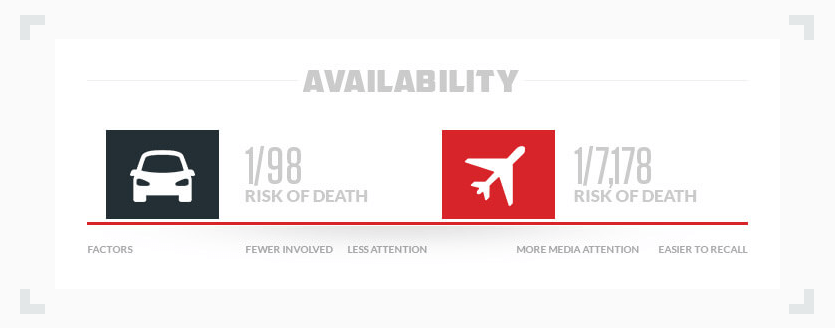How the Availability Heuristic Secretly Affects Your Sports Bets

Most of us have had someone drop us off at an airport and exclaim, “Have a safe flight!” In reality, we should wish them a safe drive, because the chances of something going wrong are much higher in an automobile than a car.
When someone wishes you a “safe flight” and heads back onto the highway, it’s a classic example of the ‘availability heuristic’ at work. When it comes to assessing outcomes and risk, we often let the events that are easiest to remember to dictate our understanding of probability.
In this article, we break down exactly what the availability heuristic is, give examples of how it works within and outside sports, and provide you with actionable advice on how to combat it.
What Is the Availability Heuristic, Exactly?
Before we get into the availability heuristic itself, it’s essential to define what a ‘heuristic’ is first.
A heuristic is just another word for a ‘rule of thumb’
A heuristic is just another word for a ‘rule of thumb’. When approaching a problem, we often substitute a heuristic for a more sophisticated analysis of a problem. This isn’t a perfect approach to solving a problem, but it’s practical, easy, and comfortable.
The availability heuristic is our natural tendency to assign a significant degree of importance to events that are either very easy us for recall or have left a powerful impression on us. We use these easy-to-recall events as a more accurate tool to assess risks and outcomes than they actually are.
We assign so much weight to memorable events because it is natural and easy, not necessarily because it’s the best way to accurately assess an outcome or a problem.
This can lead us to misunderstand the probability of events. We often gravitate towards believing that, if we can remember something, it must be extremely relevant, or at bare minimum more critical in assessing a problem than events we’ve forgotten.
Differences Between Outcome Availability and Risk Availability
The most common type of the availability heuristic is outcome availability bias. This is when we use available heuristics to judge the outcome of an event.
Let’s say we were watching sports. We’d use the recent games we remember watching to determine what the winning play of the game is going to be. If the last three NFL games we watched were decided on a two-point conversion, we might think that a two-point conversion is likely to be the deciding play in the next game we watch. However, two-point conversions winning a game are actually extremely unlikely, statistics-wise.
If we were investing, we’d use a similar process. When assessing our investment’s chances of success, we’d likely use the information that’s easiest for us recall in analyzing our probability of profit. For example, if we see news suggesting that war is imminent somewhere in the world, we might think that the price of gold will rise. However, predicting the price of gold is a much more complicated calculation, and it won’t necessarily be impacted by this recent news.
The second type of availability heuristic is risk availability. In our intro, we talked about how plane crashes usually have a higher profile in the media than car crashes. This is because they’re much more heavily reported on, and are thus easier for us to recall. As such, we often view flying to be more dangerous than driving, when the reverse is true.


When Do We Use the Availability Heuristic Most?
We use the availability heuristic in situations when we need to make quick decisions. Similarly, we will often use the availability heuristic in situations where we don’t have a ton of resources at our disposal to aid us in making a decision.
Maybe someone at a party asked what the biggest city in the world was, between Beijing, Tokyo, Dehli, and Chongqing. Most people would select one of the first three cities, as they’re the recognizable and commonly known capitals of China, Japan, and India. However, the correct answer is Chongqing, with a population of more than 30 million!
In this situation where we don’t have adequate resources to investigate the correct information, we’d likely rely on the availability heuristic in determining our answer. We’d pick the answer that springs to mind quickest.
Proof of the Availability Heuristic
If you’ve read the rest of our betting psychology series, you’re familiar with the names Amos Tversky and Daniel Kahneman, the two fathers of the entire field of cognitive biases. They’re responsible for the discovering the availability heuristic, and many psychologists have followed in their footsteps, seeking to prove its many different manifestations.
In the classic experiment that confirmed the availability heuristic, Tversky and Kahneman asked study subjects to predict the likelihood of a random word from an English text starting with the letter “k,” or words that had “k” as a third letter.
Subjects in the experiment overwhelmingly overestimated the number of words that began with the letter “K,” and overwhelmingly underestimated the number of words in English that had “K” as their third letter.
The culprit behind this was the availability heuristic – it’s much easier to recall words that start with ‘k’ (kale, knock, knife) than wrack our brains for words that have k as their third letter.
However, there are three times more words with k as their third letter than there are words that begin with k. The availability heuristic caused subjects in this experiment to confuse likely probability with ease of recall.
Real Life Examples of the Availability Heuristic
The availability heuristic causes us to incorrectly assess probability in practical, everyday situations as well. There are endless examples of the availability heuristic at work, but here are a few:
- Two married couples in your social circle file for divorce within a short period of time. As such, you perceive the divorce rates to be much higher than they are. Because these events dramatically alter the composition of our social circle (and are emotionally charged and impactful), the effect of the availability heuristic is amplified.
- We see many media portrayals of terrorism. This causes us to dramatically overrate the likelihood that we’ll become a victim, too.
- At the beach, we hear onlookers talking about a recent shark attack. We think that the chances of us falling victim to a shark attack.
- A goal scored immediately after faceoff in the overtime of an NHL game. We perceive that this kind of goal is scored a lot, when in fact it scored sporadically.
The Availability Heuristic and Sports Betting
Before we detail how the availability heuristic can affect your bets, ponder the following questions.
- Do I think that games are more likely to hit the over or under on a totals bet in the sports I bet on?
- Do I often bet on underdogs on the moneyline if they’re playing at home?
- Do I think that the favorite covering the spread is more likely than the underdog doing so?
Every bettor has a different response to these questions. However, it’s extremely likely that the answers to these questions will be biased by the availability heuristic.
If, say, a bettor’s last five totals bets have been successful – and they’ve bet on the over every time – they might be more inclined to think that the over is more likely to occur. After all, wins are pretty easy for most of us to recall.
The availability heuristic can often explain why the public favors strong favorites, or why a disproportionate number of bets are placed on a bad team that’s defied probability by recently putting together a string of wins.
It’s a lot easier for uneducated bettors to think back to memorable and recent results of sporting events, rather than do the work to understand and research win probabilities. Amateur bettors with regular jobs who place ten or more bets a day likely don’t have time to intensely scrutinize each individual bet they are making, and thus are more likely to fall into the trappings of the availability heuristic.
How to Beat the Availability Heuristic
Instead of falling into the availability heuristic trap, use resources like our guide to the best stats sites to help answer the questions above. Gaining clarity on probability and risk will aid you in combating the availability heuristic.

Evergreen Manager; Sportsbook Expert
Following a sports journalism career with his work appearing in outlets like theScore, The Province, and VICE Sports, Patrick moved into the world of content marketing to bridge the gap between great writing and SEO success. He’s brought that same mindset to lead evergreen content efforts at SBD.



